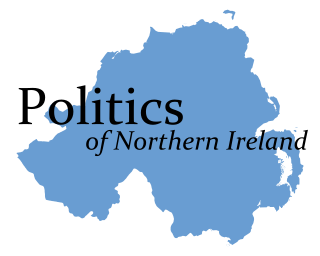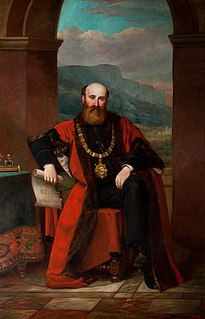
The Ulster Unionist Party (UUP) is a unionist political party in Northern Ireland. Having gathered support in Northern Ireland during the late-nineteenth and early-twentieth centuries, the party governed Northern Ireland between 1921 and 1972. It was supported by most unionist voters throughout the conflict known as the Troubles, during which time it was often referred to as the Official Unionist Party (OUP). Between 1905 and 1972 its MPs took the Conservative whip at Westminster, considered as part of the Conservative Party.

The Social Democratic and Labour Party (SDLP) is a social-democratic and Irish nationalist political party in Northern Ireland. The SDLP currently has 12 MLAs in the Northern Ireland Assembly. It has no elected representatives in the House of Commons of the United Kingdom having lost its three remaining Parliamentary seats in the 2017 general election.

The Northern Ireland Assembly is the devolved legislature of Northern Ireland. It has power to legislate in a wide range of areas that are not explicitly reserved to the Parliament of the United Kingdom, and to appoint the Northern Ireland Executive. It sits at Parliament Buildings at Stormont in Belfast. The Assembly is currently in a period of suspension, after it collapsed in January 2017 due to policy disagreements within the leadership and the resignation of Martin McGuinness following the RHI scandal. Subsequent discussions to restore the Assembly have been unsuccessful.

The second election for the Northern Ireland Assembly was held on Wednesday 26 November 2003, after being suspended for just over a year. Six members from each of Northern Ireland's eighteen Westminster Parliamentary constituencies were elected by single transferable vote, giving a total of 108 Members of the Legislative Assembly (MLAs). The election was contested by 18 parties and a number of independent candidates.
The Ulster Popular Unionist Party (UPUP) was a unionist political party in Northern Ireland. It was founded in 1980 by James Kilfedder, independent Unionist Member of Parliament for North Down, who led the party until his death in 1995.

The Good Friday Agreement referendum, 1998 was a referendum held in Northern Ireland over whether there was support for the Good Friday Agreement. The result was a majority (71.1%) in favour. A simultaneous referendum held in the Republic of Ireland produced an even larger majority (94.4%) in favour.

North Down is a parliamentary constituency in the United Kingdom House of Commons. The current MP is Sylvia Hermon, first elected in the 2001 general election. Hermon represented the constituency on behalf of the Ulster Unionist Party until 2010, subsequently sitting as an Independent.

Elections in Northern Ireland are held on a regular basis to local councils, the Northern Ireland Assembly, the Parliament of the United Kingdom, and to the European Parliament.

The Northern Ireland general election, 1949 was held on 19 February 1949. The election became known as the Chapel-gate election because collections were held at churches in the Republic of Ireland to support the Nationalist Party campaign.
Independent Unionist has been a label sometimes used by candidates in elections in the United Kingdom, indicating a support for British unionism.

The 1986 Northern Ireland by-elections were fifteen by-elections held on 23 January 1986, to fill vacancies in the Parliament of the United Kingdom caused by the resignation in December 1985 of all sitting Unionist Members of Parliament (MPs). The MPs, from the Ulster Unionist Party, Democratic Unionist Party and Ulster Popular Unionist Party, did this to highlight their opposition to the Anglo-Irish Agreement. Each of their parties agreed not to contest seats previously held by the others, and each outgoing MP stood for re-election.
Traditional Unionist Voice (TUV) is a unionist political party in Northern Ireland. The party was founded on 7 December 2007, from a split in the Democratic Unionist Party (DUP). Its first and current leader is Jim Allister who, until 2009, sat as an independent Member of the European Parliament, having been elected for the DUP in 2004. In the 2009 European elections Allister lost his seat when he stood as a TUV candidate. In June 2008, it was announced that former Ulster Unionist Party (UUP) MP William Ross had been made party president.
The Armagh by-election was held on 20 November 1954, following the resignation of Ulster Unionist Party Member of Parliament James Harden.
The North Down by-election of February 1922 was held on 21 February 1922. The by-election was held due to the appointment of the incumbent Ulster Unionist Party MP, Thomas Watters Brown, as a judge to the High Court of Justice in Northern Ireland. It was won unopposed by the Ulster Unionist Party candidate Henry Hughes Wilson. Wilson was assassinated four months later, leading to the July 1922 North Down by-election.
The North Antrim by-election of February 1899 was held on 25 February 1899. The by-election was held following the resignation of the previous member Hugh McCalmont who was a member of the Irish Unionist Party. It was won unopposed by the Irish Unionist Party candidate William Moore.
The February 1974 United Kingdom general election in Northern Ireland was held on 28 February with 12 MPs elected in single-seat constituencies using first-past-the-post as part of the wider general election in the United Kingdom.
The October 1974 United Kingdom general election in Northern Ireland was held on 10 October with 12 MPs elected in single-seat constituencies using first-past-the-post as part of the wider general election in the United Kingdom.
The 1896 United Kingdom local elections took place in late 1896 for municipal councils, as well as Rural districts. Municipal elections were held across England and Wales on Monday 2 November, with Scotland holding municipal elections the following day. Municipal elections in Ireland took place later that month, on Wednesday 25 November.









